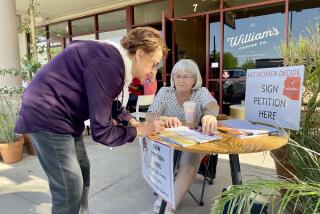Questions about an assemblyman’s health are spurring would be successors to jockey for position.
As legislative and congressional candidates gear up their fall election campaigns, one South Bay officeholder will not be on the campaign trail.
Assemblyman Curtis R. Tucker (D-Inglewood), chairman of the Assembly Health Committee, remains hospitalized in stable condition, suffering from cancer.
Tucker, 70, has not been in the Assembly chamber in Sacramento since late June, when he began to receive chemotherapy for liver cancer. As a result, he missed all of August, when lawmakers were locked in the final, whirlwind days of the 1987-88 legislative session.
The state of Tucker’s health remains a closely guarded secret, but already would-be successors are lining up to run for his seat should he die or resign.
Tucker’s name is on the November ballot in the solidly Democratic 50th Assembly District, which includes Inglewood, Lennox, El Segundo, parts of South-Central Los Angeles and Westchester. Most voters in the area are such loyal Democrats that Tucker, a seven-term incumbent, is expected to have little difficulty beating Republican challenger Mike Davis despite the health issue.
“He is going to win regardless. He could die and win,” said a Tucker loyalist. “There is no way that seat is going to go to a Republican.”
Officially, Tucker’s Capitol and district office staffs will not discuss his condition, saying they are under orders from his family not to talk about it.
“We do not know when he’s coming back,” a staff member said. “He really needs his rest. He really needs his privacy respected.”
A spokeswoman for Daniel Freeman Hospital in Inglewood confirmed that Tucker is in the hospital, but declined to provide any other information, in keeping with his wishes.
The assemblyman’s son, Curtis Tucker Jr., said in an interview Friday that his father has been in and out of the hospital in recent months. He has been hospitalized continuously for the past three weeks and is in stable condition, the younger Tucker said.
“He is responding to treatment” for lymphoma, Tucker said. “He is positive. He is optimistic. He is in good spirits.”
The younger Tucker said his father needs to build up his strength. “The doctors are saying he really shouldn’t try anything until the first of the year.”
But a source close to Tucker says the cancer has spread throughout his lymph system and it is not treatable.
In the absence of solid information about the assemblyman’s health, there is a lot of talk about who might succeed him.
The younger Tucker, 34, an administrative assistant to Assemblywoman Gwen Moore (D-Los Angeles) said he is interested in running for his father’s seat. “That is something both of us want,” he said. “I’m in no hurry. I’m not going to ask him to step aside.”
Tucker said “it’s premature” to discuss who will represent the district after his dad. “We’re all going on the assumption that he is going to be reelected.”
However, in addition to Curtis Jr., the names being heard most often as potential candidates are Inglewood Mayor Edward Vincent, Inglewood City Councilman Daniel Tabor, Inglewood school board member Lois Hill-Hale and Rita Walters, a member of the Los Angeles school board.
Tucker crushed Tabor in the Democratic primary last June, winning 76% of the vote.
His Republican rival, Los Angeles businessman Davis, conceded that Tucker will “probably be reelected” because the district is so heavily Democratic. But he said the assemblyman’s health will be an issue this fall.
“It is a question of integrity. The public has a right to know the true state of Assemblyman Tucker’s health,” Davis said. “Certainly when it affects an individual’s ability to function, it becomes an issue.”
Curtis Jr. said his father is aware of all the murmurs about would-be successors, but noted: “They’re just going to have to wait.”
Lopsided battles . . . Elsewhere in the South Bay, state lawmakers are well-positioned to seek reelection this fall.
They have the benefit of the incumbency to generate news and raise the money needed to reach voters through mailers. Add to that the carefully drawn district lines that mark safe Democratic or Republican territory, and challengers have their work cut out for them.
After winning a grueling and expensive Republican primary last June against a well-financed opponent with a prominent name, Assemblyman Gerald N. Felando (R-San Pedro) will face Torrance City Councilman Mark Wirth this fall.
Felando is running for a sixth term in the staunchly Republican 51st Assembly District, which includes Torrance, Lomita, the beach cities, the Palos Verdes Peninsula and his neighborhood in San Pedro.
Wirth, a Democrat, plans to challenge Felando on the same kind of quality-of-life environmental issues--traffic, offshore oil drilling and toxic wastes--that Republican Deane Dana III used in an unsuccessful bid to win the GOP nomination.
Meanwhile, to the north and east, Assemblyman Richard E. Floyd (D-Hawthorne) isn’t taking any chances in the usually Democratic 53rd Assembly District. Floyd won a solid victory in November, 1986, after overcoming a late Republican assault.
Like Felando, Floyd has been building his campaign treasury for the fall contest.
Floyd will face Hawthorne City Councilman Charles Bookhammer, a Republican insurance agent who says the five-term assemblyman does not pay attention to the needs of his district. The race will be waged in Gardena, Hawthorne, Lawndale, Carson, and parts of Harbor City and San Pedro.
The other local lawmaker up for reelection this fall, Sen. Robert G. Beverly (R-Manhattan Beach), has a commanding lead in fund raising over Democrat Jack Hachmeister.
At the end of June, Beverly had $406,180 on hand for his reelection campaign in the Republican 29th Senate District, which includes the beach cities, Torrance, Lomita, the Palos Verdes Peninsula, San Pedro and parts of Long Beach.
Hachmeister, who admits that fund raising has been difficult, estimated he had $500 to $600 available at the end of the last reporting period.
More to Read
Get the L.A. Times Politics newsletter
Deeply reported insights into legislation, politics and policy from Sacramento, Washington and beyond. In your inbox three times per week.
You may occasionally receive promotional content from the Los Angeles Times.






